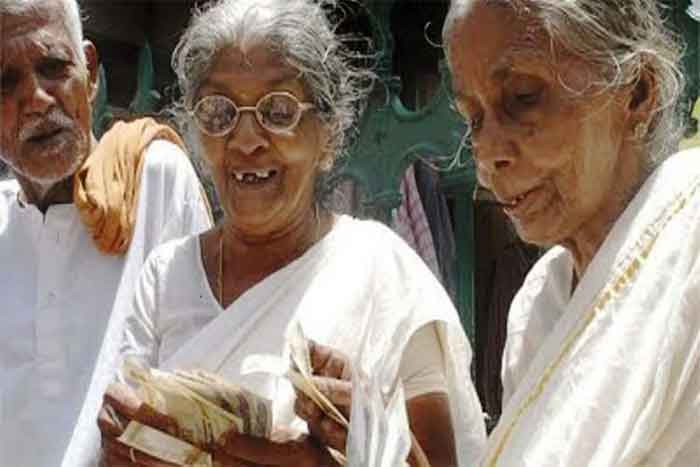
The population of elderly (60 years plus) citizens in India is around 140 million. The union ( central) government pays annual pensions worth around Rs. 180,000 crore ( one crore=10 million) to its former employees numbering between 6 to 7 million. For the remaining elderly it provides about Rs. 9700 crore ( inclusive of some other welfare spending). During recent years, this budget, listed under the National Social Assistance Program ( NSAP) has stagnated in money terms, declined in real terms. Leaving aside its own former employees, the union government spends just around Rs. 85 (a little above 1 US dollar) per capita per month on pensions of all other elders, including the poorest. What it spends on non-contributory pensions of these poorer elders is just about 0.4% of what it spends on contributory pensions of its own employees. The NSAP provide just Rs. 200 per person per month ( equivalent of less than 3 US dollars ), this too only for a minority of elders, those below poverty line, in the age group 60-79 and Rs. 500 per person per month for the much smaller numbers in the 80 plus age group. To this small amount several state government add their optional share.
If we include the state governments’ employee pensioner bill, then about Rs. 430,000 crore are provided to about 20 million regular pensioners by union and state governments, but only about Rs. 25,000 crore for pensions to all the other elderly people numbering around 120 million.
Clearly about 120 million elderly people out of a total of about 140 million do not get any significant pension at present. Their number will increase further with the implementation of Agniveer scheme in armed forces. In addition the number of elderly people is expected to grow more compared to the general population. If we exclude about 5 million elders who are rich enough not to need any pensions, then we still must plan for the pension needs of around 115 million elders who are either not getting any pension at all, or else, in the case of about 90% of them, are getting less than Rs. 1500 per month.
This situation should be remedied by ensuring that all these 115 million get a pension of at least Rs. 3000 per month, tied to the price index to increase with the passage of time. Thus an elderly couple can get Rs. 6000 per month as assured pension. The main initiative for this can be taken by the union government, and the state governments can fill in the gaps.
In the case of the poorest sections, several people tend to age early, particularly in the case of those with health problems. In such cases the age-limit can be relaxed and reduced to up to 55 if needed.
This will be a very significant help for people in their old age. In the case of elderly people living alone this will be a lifeline, but even in the case of those living with their families this can be a big help. This will add much to their dignity and the fulfillment of several small needs for a little cash. Medicines, spectacles, some special nutrition for medical reasons and buying some small presents for grandchildren are some such needs and small joys that easily come to mind. Studies have shown that depression or a sense of being left out is very common among elderly people. The monthly assured availability of cash, which increases with inflation, will surely help to reduce this somewhat. Of course this is not seen as an isolated measure to help our senior citizens, but this may well be the single most important step which the country can take to help its elderly population.
There are several schemes planned separately for farmers and farm workers and urban poor, but this is one overarching step which will benefit all sections. Apart from the elderly getting a big relief directly, their family members too will be happy.
It is high time we realize that just as government employees need a pension in their old age, similarly farmers and workers and artisans and self-employed who have toiled for several decades also need some rest and relief and security in their old age and therefore they need pensions. This is a right which no welfare state can refuse. Fiscal options are available if there is the requisite political will. Organizations like Pension Parishad which have been pleading for this can help in taking forward such an initiative.
Bharat Dogra is Honorary Convener, Campaign to Save Earth Now. His recent books include A Day in 2071, Planet in Peril and Man over Machine.









































